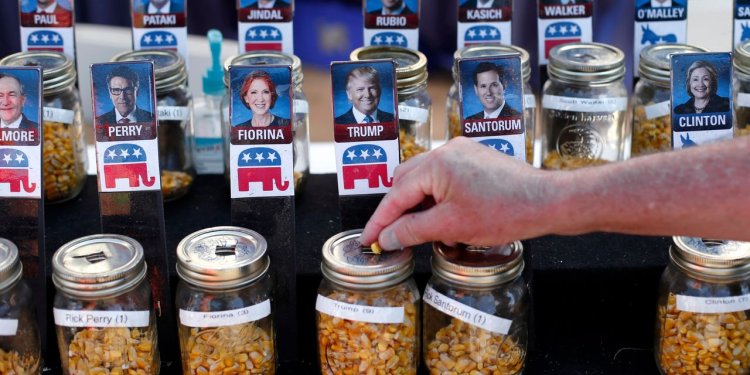Why Democrats Lost Iowa
White, rural voters have turned the political battleground into a Republican stronghold, putting it further out of Democrats’ reach Donald Trump won Iowa in 2016 and 2020, exemplifying a rightward shift in the state. Photo: Paul Sancya/Associated Press By Catherine Lucey and Paul Overberg Aug. 8, 2023 5:00 am ET Just about every Republican presidential candidate plans to attend the Iowa State Fair that begins in Des Moines this week. But don’t expect to see President Biden there. Iowa was once a center of gravity for both political parties during presidential elections and a key swing state. In recent years, it has turned so red that Democrats have little political power in the state and the party’s candidates have few reaso


Donald Trump won Iowa in 2016 and 2020, exemplifying a rightward shift in the state.
Photo: Paul Sancya/Associated Press
Just about every Republican presidential candidate plans to attend the Iowa State Fair that begins in Des Moines this week. But don’t expect to see President Biden there.
Iowa was once a center of gravity for both political parties during presidential elections and a key swing state. In recent years, it has turned so red that Democrats have little political power in the state and the party’s candidates have few reasons to go.
The Hawkeye State helped elect Barack Obama president in 2008 and 2012 before Donald Trump carried it in 2016 and 2020. Today Republicans hold majorities in both chambers of the legislature and the governor’s mansion, and Iowa doesn’t have a single Democratic member of Congress. Only one Democrat holds a statewide office, auditor Rob Sand.
A confluence of factors that mirrors national trends has pushed the state to the right. Iowa is more white and rural than the rest of the country, and Republicans have grown stronger with those voters, particularly through Trump’s populist appeals. Meanwhile, Democrats have lost droves of voters in rural areas, and Iowa has fewer of the minority and urban voters who tend to be more liberal and have helped the party offset rural losses. Some Iowa Democrats say they are struggling to connect with voters on cultural issues as Americans have grown more polarized.

The party’s shrinking presence in Iowa could put it further out of reach for Democrats and make it harder to reclaim these lost voters.
Iowa’s rightward shift was evident in 2014 when Joni Ernst, a Republican, captured the Senate seat held for 30 years by Democrat Tom Harkin, with a folksy campaign that emphasized her upbringing on a farm. That trend accelerated with Trump, who placed second in Iowa’s 2016 Republican caucuses, but won the state resoundingly in the general election. Democrat Hillary Clinton turned off some voters, while Trump’s appeals to block illegal immigration and economic populism resonated with them.
“You had these folks who normally would have voted for me who voted for Republicans,” said Steven Sodders, a former Democratic Iowa state senator who lost his re-election bid in a central Iowa district in 2016. “Trump’s message spoke to some of those union members.”
According to census data, 83% of Iowa’s population is white, compared with 58% nationwide. A big part of this is fewer Hispanics, who make up about 7% of Iowa’s population, compared with 19% nationwide. The state’s share of foreign-born is about 5% vs 14% for the U.S. About a third of Iowans live in a rural area, while a fifth of Americans overall do. Just a few states, including Vermont and Maine, remain solidly Democratic in presidential elections despite being whiter and more rural than Iowa.
Sodders also noted the so-called brain drain in the state that has siphoned off college-educated voters who lean left. “My daughter just graduated from Iowa State with her masters and she took a job in Pittsburgh,” he said. “She told me with the politics in Iowa, I’m not moving back there.”

Iowa’s rightward shift was evident in 2014 when Joni Ernst, a Republican, won the Senate seat held for 30 years by a Democrat.
Photo: Charlie Neibergall/Associated Press
To reverse the trend in states such as Iowa, former Illinois congresswoman Cheri Bustos,
who led the House Democratic campaign arm during 2020, said Democrats need a game plan for rural America. An election postmortem she wrote determined that Democrats who won in Trump districts did so by engaging with voters, focusing on issues such as healthcare and addressing regional concerns such as bridges or roads that need repairs.“As a whole, if you’re looking at the national Democratic Party, it has moved to the left,” she said. “But if candidates want to do well in rural America, the national party that has swung leftward is not going to resonate.”
Sand said flipping Iowa back is doable. He said that in his race he focused on his record of uncovering misspent money, his willingness to stand up to powerful people and at times buck his own party. He also does 100 town halls in the state’s 99 counties each year.
The Democratic National Committee said it has invested more money in Iowa since 2020, including from a DNC “Red State Fund” to build long-term infrastructure in GOP states. Ken Martin, vice chairman of the DNC, who is in charge of the state parties, said candidates should emphasize an economic populist message.
The Democratic Congressional Campaign Committee has listed two Republican-held seats in Iowa as top targets for 2024.
Rita Hart, a former state senator who chairs the Iowa Democratic Party, said Democrats need to run on their record, citing Biden’s investments in broadband internet, healthcare and infrastructure. “ Joe Biden has a strong case to make here in Iowa,” she said.
Biden’s legislative efforts have failed to gain traction. An Iowa poll conducted in the spring showed just 30% of Iowans approved of his job performance.

The Iowa State Fair is a popular campaign destination for presidential candidates.
Photo: eric thayer/Reuters
President Biden won in 2020 without Iowa’s support, where he had 45% of the vote to Trump’s 53%. While Biden isn’t scheduled to attend the fair, long-shot Democratic hopefuls Robert F. Kennedy Jr. and
Marianne Williamson are expected to be there and the DNC plans to send high-profile Democrats to the state to counter the Republicans.It isn’t unusual for an incumbent president who isn’t facing a competitive primary to skip the fair, especially given Iowa’s diminished role in the nomination process. Obama didn’t go the year before he ran for his second term, though he attended in 2012. Trump didn’t attend in 2019, but is expected this year.
Democrats earlier this year stripped Iowa of its role hosting the leadoff caucuses, which for five decades have given the small state an outsize influence on the national stage. The decision followed a botched vote count in 2020. Republicans still plan to kick off in Iowa next year, and Democrats have said they would hold an unsanctioned event there.
“In the absence of the Democratic caucuses, you lose that Democratic organizing power across the state,” said Rachel Paine Caufield, a political-science professor at Drake University in Des Moines.
The change means that Iowa won’t have some of the events that long helped local Democrats raise money and train up-and-coming political activists.
SHARE YOUR THOUGHTS
How do you think the absence of Democratic presidential hopefuls at the Iowa State Fair reflects the Democratic Party’s broader challenges? Join the conversation below.
“All the activists I know, more than half got their start on a presidential caucus campaign,” said Pat Rynard, founder of Iowa Starting Line, a left-leaning website that covers state politics. “Without that kind of excitement, it makes it that much harder to recruit the next generation of activists.”
Since taking control in the state, the GOP legislature has passed legislation to expand school vouchers and restrict abortion. A law that would ban most abortions after about 6 weeks of pregnancy is tied up in the courts.
Jeff Kaufmann, who chairs the Republican Party of Iowa, said GOP Gov. Kim Reynolds successfully ran on these issues, which shows their resonance with voters. But he agreed that the state could edge back toward the Democrats if the party connects better with rural and blue-collar voters.
“There are a lot of Iowa Democrats that are moderate. They are disillusioned with their party and they are leaving,” he said. “I’m not worried about a dramatic shift right now. But you’ll never hear me say Iowa is forever red.”
Write to Catherine Lucey at [email protected] and Paul Overberg at [email protected]
What's Your Reaction?













